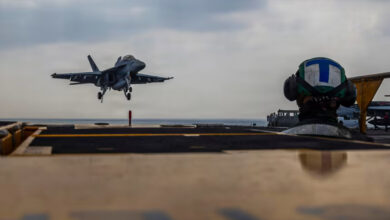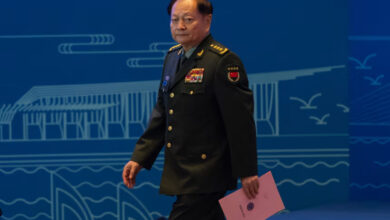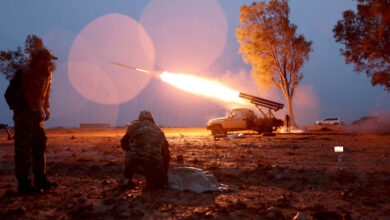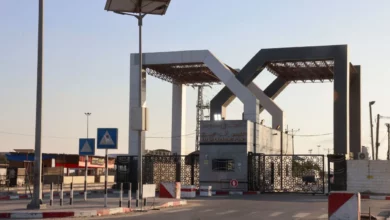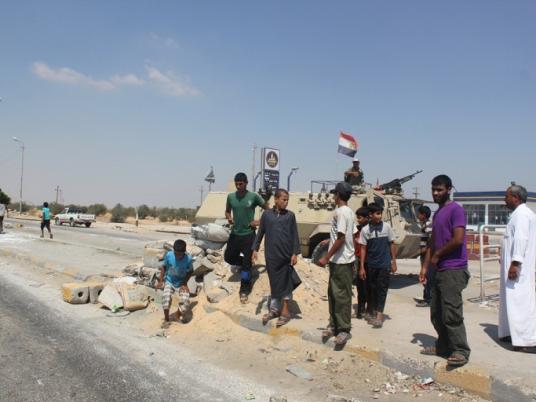
Those living in Rafah have military forces responsible for securing the border at their doorsteps. While this should be extra protection for the locals, on Sunday, it was the locals who struggled to save the soldiers undergoing a brutal attack.
The failure to prevent an attack on a military checkpoint that unknown militants carried out and the slow response of both forces on the ground and officials stand as a staggering demonstration of the ongoing security vacuum in Sinai, Egypt’s strategic eastern gate.
While local media and politicians alike are dramatically mourning the deceased soldiers, slamming the terrorist playground that Sinai has reportedly become, there is little attention to the incumbent state failure in the peninsula, as manifest in this incident, locals say.
As they were getting ready to break their Ramadan fast, leaving the watchtower vacant, soldiers at a military checkpoint situated two miles away from the Karam Abu Salem border crossing and surrounded by residential houses were attacked by unknown militants, killing 16 soldiers and injuring seven others.
Witnesses said the attackers came in three cars, and in 10 minutes shot the soldiers at the site and stole a military tank. Carrying four of the attackers, the tank headed toward the Israeli border and was destroyed by Israeli aircraft seconds after crossing into its territory.
Those residing near the attack site and those who rushed to the scene to help the injured soldiers said they had to act on their own, and faced a lack of cooperation from military forces stationed at checkpoints set up every few miles inside Rafah.
Bassam Ouda, who was among the locals who transported the bodies of the soldiers to Rafah Hospital in their personal cars, said the military forces in nearby checkpoints refused to help them.
“We told the officers to come secure us while we got the injured soldiers. They refused, saying that they didn’t receive such orders and couldn’t desert their posts,” Ouda said.
Ouda and many of the volunteers were still haunted by the image of the soldiers, whom they found lying face down on the food they were getting ready to break their fast with.
Witnesses said ambulances arrived after locals had already transported most of the bodies and the injured soldiers to Rafah Hospital, and that military forces arrived at the site after the attack had finished and the perpetrators had escaped.
Mohamed al-Moattar, a shop owner who lives near the site, said Monday that members of different tribes were still chasing the attackers on the loose. He said this has always been Sinai’s version of law enforcement, which lacks any reliance on the police. According to tradition, each tribe can sacrifice up to five people.
Indeed, locals who witnessed the attack grieved the loss of the soldiers whom, according to Bedouin traditions, they considered themselves responsible to protect.
The day after the attack, only one tank with three soldiers was at the site, and despite official reports that additional forces would be deployed in the area, the military presence in Rafah was limited to the usual checkpoints.
Slow action on the ground was mirrored by similarly slow reactions on the official level.
President Mohamed Morsy only issued standard statements following the attack. After announcing a visit to Rafah, Morsy only went as far as Arish almost a day following the attack, and failed to show up to the soldiers’ military funeral, which took place Tuesday.
Similarly, the Supreme Council of the Armed Forces only reacted publicly to the incident Monday, issuing a statement that said 35 people carried out the attack, with the help of agents from Gaza who fired on the Karam Abu Salem crossing.
A failing state
Many who witnessed the attack are saddened by the difference between the slow reaction on the Egyptian side and the swift reaction on the Israeli side, especially with reports in the Israeli paper Haaretz that Israeli officials had warned the Egyptian government of possible attacks. There are reports that Israel evacuated its citizens from the area two days in advance.
Saleh Abu Lefeita, a car dealer and a Rafah community leader, said the government had evacuated some residents on the border 20 days prior to the attack.
“They had prior knowledge, but no will to resist. If there was resistance, there would have been at least some injuries on the side of the attackers,” Abu Lefeita said, regretting the fact that 16 soldiers were killed and a tank stolen without one bullet fired in defense, while the Israeli forces shot down the tank seconds after it breached its territory.
Many locals complained this is not the first time military forces have failed to take the necessary action. Locals said the many military checkpoints inside Rafah seem to be only for show, as extremist groups train out in the open and goods smuggled into Gaza through illegal tunnels pass right through the checkpoints.
Last month, two soldiers were shot at another Rafah checkpoint, and in August last year, Israeli forces killed five Egyptian security officers on the border, triggering a diplomatic crisis that gradually died down.
Israeli authorities said the Egyptian officers were killed by mistake in a chase of Palestinians who had crossed over from Sinai to carry out an attack in the Israeli city of Eilat days before that resulted in eight deaths and 30 injuries.
In another demonstration of the loose security grip in Sinai, unknown masked men have bombed the pipelines delivering gas to Israel 15 times during the course of the last year and a half, without getting caught. The most recent attack occurred last month.
Sunday’s attack escalated security fears that Sinai residents were already struggling with. Sawsan al-Ayesh, who lives next to the attack site, was terrorized into leaving her house with her children, and moved in with her mother.
When the attackers threw what seems to have been a smoke bomb before taking off with the tank, Ayesh thought her house was going to be blown up with her and her children in it.
“We used to feel safe, that the military is around us. Now we’re scared and we can’t go back to our homes. We’re scared that we’ll get blamed for this while we are on the line of fire. These soldiers are family for us,” she said.
The incident has caused renewed calls for the modification of the three-decades-old peace treaty with Israel, which allows Egypt only a limited number of soldiers on the border, with meager arms.
Whoever’s the attacker, we’re in charge
Locals vehemently denied early reports that the operation was a joint effort between Palestinian factions and Sinai Bedouins, saying that while Bedouins could have been hired by the perpetrators to help them, they couldn’t have been involved in planning the attack.
“This operation is new to us and it’s strange for people here. People here may get involved in individual acts of violence related to revenge, but this kind of organized operation is alien to this area,” Abu Lefeita said.
The incident has also triggered some anti-Palestinian sentiment among Bedouins in Sinai who blame Palestinian factions — sentiments that were quickly grabbed by the media and presented in an increasingly nationalistic rhetoric.
Many witnesses said they recognized the perpetrators’ Palestinian dialect and that they were repeating jihadist chants as they carried out the operation.
On Monday, a few dozen locals closed off the Sheikh Zuwayed main road with burnt tires, demanding that the tunnels through which people and goods are smuggled in and out of Gaza be destroyed and that the Rafah crossing be closed. They also called for police activity to return the area.
Morsy has been criticized for opening up the Rafah crossing, a decision that was reversed following the attack.
“This was a Palestinian operation targeting Israel, but we won’t allow this to happen through our lands while the military does nothing,” said Nasser Abu Ekr, a Sheikh Zuwayed community leader who participated in the protest. “What’s more precious than the Egyptian soldiers? This means that they can spill the blood of any of us next.”
Saeed Hamad, an elderly Bedouin man whose house is across from the attacked military site, cried as he recounted how the locals were unable to come to the rescue of the soldiers after they were shot.
“These are our children that died. This is an Israeli plot, we would be fools to think otherwise,” said Hammad.
Hammad believes the second scenario, prevalent among some residents who refuse to blame Palestinians for the incident, that the attack was an Israeli plot aiming to force Egyptian authorities to close the Rafah crossing and destabilize Sinai.
Hopeless that authorities will ever provide the necessary security in Sinai, Hammad asked them to let locals take up arms and defend themselves and their army if necessary.
“We are the pillars of security here. The residents of the area know it best, they should support us and arm us or let us arm ourselves,” said Hammad. “We want the government to treat us like people, not terrorists. This is our country and these are our homes, we won’t jeopardize them.”

